|
|

The Catalyst 1200 series switch is an Ethernet-to-Ethernet and Ethernet-to-CDDI/FDDI switch that provides high-speed transparent bridging between Ethernets and high-speed translational bridging between Ethernet and Copper Distributed Data Interface (CDDI) or Fiber Distributed Data Interface (FDDI). The Catalyst 1200 series switch includes four models: WS-C1201, WS-C1202, WS-C1211, and WS-C1212. Using content-addressable memory (CAM) technology, models WS-C1201 and WS-C1211 can learn up to 1,024 Ethernet addresses, and models WS-C1202 and WS-C1212 can learn up to 4,096 Ethernet addresses.
The switch has eight 10-Mbps Ethernet ports and two 100-Mbps CDDI or FDDI ports that comply fully with the FDDI and American National Standards Institute (ANSI) draft specifications for CDDI multilevel transmission (MLT-3) A and B ports.
The eight 802.3 Ethernet ports are 10BaseT (T for twisted pair) on the WS-C1201 model or 10BaseF (F for fiber) on the WS-C1211 model.
The switch can sit on a desktop, mount on a wall, or mount in an Electronic Industries Association (EIA)-compliant 19-inch open or closed rack.
Following are the features of the Catalyst 1200 series switch:
The Catalyst 1200 series switch complies fully with FDDI Station Management (SMT) Specification Revision 7.3. A network administrator can monitor and control the switch from anywhere on the network using any SNMP management station.
The front panel of the switch has LED indicators for switch, ring, and port status as shown in Figure 1-1 and Figure 1-2.


Table 1-1 lists the descriptions of the front-panel LEDs, which are shown in Figure 1-3 and Figure 1-4. Use the LED descriptions in Table 1-1 to verify proper operation and for troubleshooting.
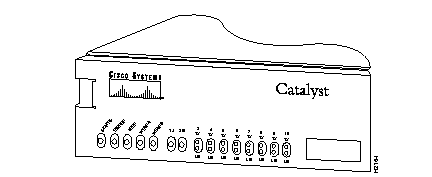
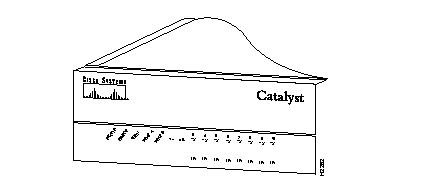
| LED | Description |
|---|---|
| Status | The switch performs a series of self-tests and diagnostics. If all the tests pass, the status LED is green. If any test fails, it is red (or orange for a minor fault). |
| Ringop | Indicates if the ring is operational. If the ring is operational, the ringop LED is green. If the ring is not operational, the ringop LED is off. |
| Thru | If the CDDI/FDDI A and B ports are connected to the primary and secondary rings, the thru LED is green; otherwise it is off. |
| Wrap A | If the CDDI/FDDI A port is connected to the ring and the B port is isolated, the wrap A LED is green; otherwise it is off. |
| Wrap B | If the CDDI/FDDI B port is connected to the ring and the A port is isolated, the wrap B LED is green; otherwise it is off. |
| Port 1/A status | If the CDDI/FDDI A port is connected to the ring, the port 1/A LED is green. If the CDDI/FDDI A port receives a signal but fails to connect, or a dual homing condition exists, the port 1/A LED is orange. The LED is turned off if no receive signal is detected. |
| Port 2/B status | If the CDDI/FDDI B port is connected to the ring, the port 2/B LED is green. If the CDDI/FDDI B port receives a signal but fails to connect, or a dual homing condition exists, the port 2/B LED is orange. The LED is turned off if no receive signal is detected. |
| Port n TX1 | Whenever an Ethernet port is transmitting a packet, the transmit (TX) LED is green for approximately 50 ms2; otherwise it is off. |
| Port n LG1 | The link good (LG) LED displays the link integrity status of a LAN port. The LG LED is green if the link integrity is good. The LG LED blinks to indicate that a collision is detected on this link. |
Access to the reset switch, which is located behind the front panel, is through a small hole approximately one and a half inches to the right of the front-panel LEDs. (See Figure 1-5 or Figure 1-6.)


The rear panel of the switch has an AC power receptacle, an optical bypass switch receptacle and LED, an EIA-TIA-232 admin. port, a card slot for an optional CDDI or FDDI A/B port card, eight Ethernet 10BaseT (WS-C1201) or 10BaseF (WS-C1211) ports, and the SUM interface port (and LEDs). (See Figure 1-7.)
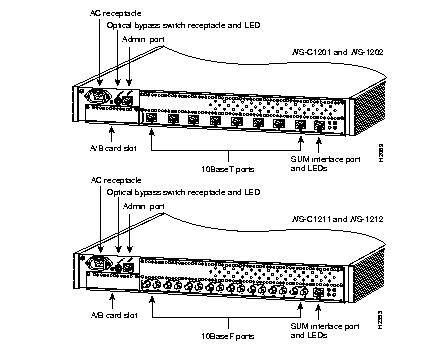
The chassis has no power ON/OFF switch. Power is applied when the power cable is connected between the switch and the AC source.
The A/B card slot supports the following configuration: single-MAC DAS with dual homing configuration for FDDI (can also be used as an SAS). The A/B card slot also accepts CDDI/MLT-3 port cards. See Figure 1-8 for unshielded twisted-pair (UTP) and shielded twisted-pair (STP) connections.
Following are the three models of A/B port cards available:
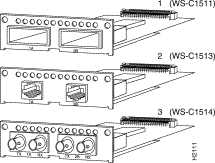
The A/B port cards allow the switch to connect to a dual ring as a peer connection or to the master (M) port of another concentrator (cascaded tree configuration). To add an A and B port to the switch, insert an optional A/B port card. For A/B port card installation, see the chapter "Hardware Installation."
The power receptacle uses the AC power cord supplied with the switch. The power supply automatically accepts either 110 volts alternating current (VAC) or 230 VAC. To apply power, attach the power cord. To disconnect power, remove the power cord. There is no On/Off switch.
The 6-pin mini-Deutsche Industrie Norm (DIN) connector is used to connect an external optical bypass switch to the switch. When idle, the optical bypass switch removes the nonfunctional dual attachment switch from the ring.
An activated bypass switch inserts the Catalyst Switch into the ring. Use an optical bypass switch only with the A/B port card option. If you install or remove an optical bypass switch, you must reset the Catalyst Switch. The bypass LED is on when the bypass switch is connected.
The admin. port is the console terminal connection to the switch. To use the admin. port, connect an EIA/TIA-232 terminal (configured for 9,600 baud, no parity, eight data bits, and one stop bit), modem, or network management workstation. The admin. port enables you to perform the following functions:
Ports 3 through 10 are IEEE 802.3 Ethernet 10BaseT (for the WS-C1201) or IEEE 802.3 Ethernet 10BaseF (for the WS-C1211). The 10BaseT ports use straight-through, RJ-45, modular UTP cables for connection to end systems, and cross-connect, RJ-45, modular cables for connection to other switches and concentrators. The 10BaseF ports use ST-type connections and multimode optical-fiber cable.
The stackable unified management (SUM) port is an out-of-band Ethernet 10BaseT port using a female RJ-45 UTP connection. The SUM port uses an RJ-45, modular, cross-connect cable when connecting to end systems; and straight-through cable when connecting to hubs. You can connect the SUM port to an Ethernet 10BaseT hub for Telnet, File Transfer Protocol (FTP), and SNMP management connection to the switch. For LED locations, refer to Figure 1-9. Table 1-2 lists the functions of the four SUM port LEDs.
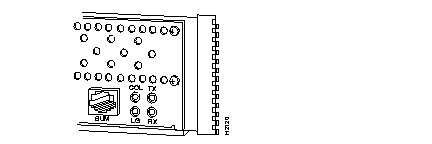
The optional CDDI-FDDI translator (model number WS-C703) provides a connection between CDDI and FDDI interfaces. The CDDI-FDDI translator includes an AC power adapter. The translator accepts an FDDI media interface connector (MIC) on one end and a CDDI (RJ-45) connection on the other end. Figure 1-10 shows two views of the translator.
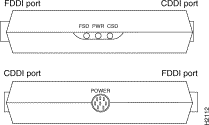
One side of the translator has three status LEDs: FDDI signal detect (FSD), power (PWR), and CDDI signal detect (CSD). The other side of the translator has the power connector.
Table 1-3 lists the specifications for the switch.
| Specification | Description |
|---|---|
| Dimensions (H x W x D) | 2.7 x 17.4 x 16" (6.96 x 44.2 x 40.6 cm) |
| Weight | 17 lb (7.7 kg) |
| AC and DC | 100 to 120 VAC, 2.0A maximum, 60 Hertz (Hz) 200 to 240 VAC, 1.0A maximum, 50 Hz 12A @ +5 VDC, 1A @ +12 VDC, 0.5A @ -12 VDC |
| Thermal dissipation | 80W, maximum (273.04 Btus/hr) |
| Operating temperature | 32 to 104°F (0 to 40°C) |
| Storage temperature | -40 to 167°F (-40 to 75°C) |
| Relative humidity | 10 to 90% (noncondensing) |
| EMI1 certifications | FCC Class A (47 CFR, Part 15) CISPR 22 Class A VDE Class A VCCI Class 1 |
| Safety approvals | UL: 1950 CSA-C22.2 No. 950-M89 EN60950 |
| Microprocessor | 20 megahertz (MHz) 68EC030 for the NMP2 |
| Memory | 1 MB of Flash memory 4 MB of packet-buffer DRAM3 32 kilobytes (KB) of NVRAM4 |
| Interface ports | Eight IEEE 802.3 Ethernet 10BaseF (WS-C1211) Eight IEEE 802.3 Ethernet 10BaseT (WS-C1201) A/B CDDI ports or A/B FDDI ports EIA/TIA-232 admin. port 10BaseT SUM port |
| Network connectors | 10BaseF (ST) 10BaseT (RJ-45) CDDI (RJ-45) FDDI (MIC or ST) Optical bypass switch: 6-pin mini-DIN SUM port: RJ-45 Admin. port: RJ-45 |
| Network management | SMT 7.3 SNMP agent RMON agent (optional) |
| MIBs | See the appendix "Supported Protocols and MIBs" |
| LED indicators | Concentrator status Ringop Thru Wrap A Wrap B Traffic meter Link status (each link) |
| Maximum station-to-station cabling distance | 625/125-micron multimode fiber: 1.24 miles (2 km) 50/125-micron multimode fiber: 1.24 miles (2 km) 8/125-micron single-mode fiber: 18.6 miles (30 km) Category 5 UTP5: 328' (100 m) IBM Type 1 or Type 2 STP6: 328' (100 m) |
| FDDI transmit power levels: Single-mode fiber Multimode fiber | Average optical power: Maximum: -4.0 dBm7 Minimum: -7.0 dBm Maximum: -14.0 dBm Minimum: -18.5 dBm |
| FDDI receive power levels: Single-mode fiber Multimode fiber | Average optical sensitivity: -33 dBm Average maximum input power: -14 dBm Average optical sensitivity: -34 dBm Average maximum input power: -14 dBm |
|
|